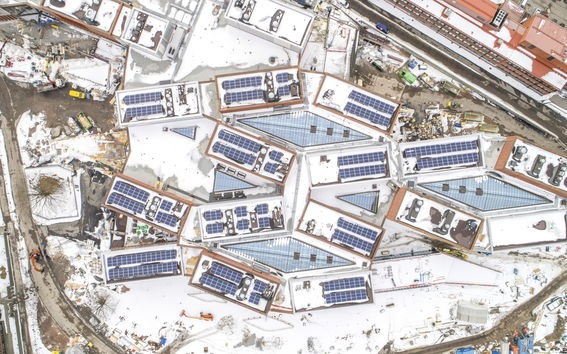Solar power seen as expensive without reason – already a viable option for one in three residential buildings

Integrated solar power plants would be cost-effective investments in a third of residential buildings in the Helsinki Metropolitan Area, according to a new study by real estate economics researchers at Aalto University. The researchers calculated the economic viability of solar power for roughly 89 000 buildings, covering almost the entire building stock of the Helsinki Metropolitan Area.
Production costs have given solar power a reputation for being expensive, which has played a part in hindering wider adoption. A straightforward comparison of production costs does not, however, account for the savings that can be realised in energy transmission fees and taxes or the property value increases brought on by solar power plants. Solar power is most profitable in city centres, where energy demand is reliable.
'Our study is an attempt to prove this economic logic. Some property investors have already noticed it, but investments to date have been rather modest,' says Postdoctoral Researcher Jussi Vimpari of Aalto University.
Partly to blame for the lack of investment is current legislation, which results in small energy producers receiving low compensation for their surplus electricity. According to the study, solar power could become profitable in the coming years for a majority of both commercial and residential properties if the pricing model was altered.
'Legal reform would encourage more property owners to make larger investments and thus promote the spread of solar power. It would also provide business opportunities for banks: a building-integrated energy system could, for example, be part of a mortgage,' Vimpari says.
Solar power could provide over 10% of the energy used by properties in the Helsinki Metropolitan Area. This roughly translates to a billion euros in investments.
'Increasing clean energy production through private funding is a win-win scenario. It means giving citizens a concrete possibility to make sustainable choices and combat climate change,' says Professor Seppo Junnila.
The study is part of Aalto University's project to look for ways to promote small-scale production of renewable energy. The project has received funding from Business Finland and the European Institute of Innovation & Technology's (EIT) Climate KIC programme, which supports efforts to curb climate change and promotes innovations that help to adapt to its effects.
See the article, published in Energy: https://doi.org/10.1016/j.energy.2019.02.049.
Further information
Professor Seppo Junnila, School of Engineering, Department of Built Environment
seppo.junnila@aalto.fi
Postdoctoral Researcher Jussi Vimpari
jussi.vimpari@aalto.fi
Read more news

Nature of Process: Exhibition by the students of the ‘Personal Exploration’ Course
Nature of Process is a multi-material exhibition of 14 Master´s students of Aalto ARTS
Doc+ connects research impact with career direction
Doc+ panels have brought together wide audiences in February to discuss doctoral careers and their diversity.
Join a Unite! matchmaking event on forging new consortia for Horizon Europe applications
Calling researchers and industry partners to connect at a virtual matchmaking session designed to spark project collaborations for Horizon Europe funding. Registration deadline, 12 March.






